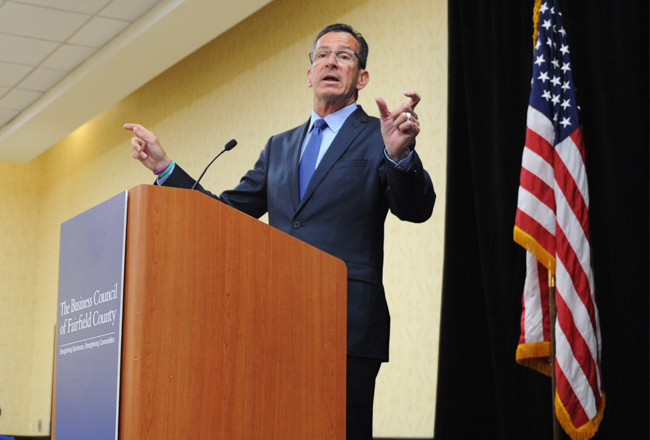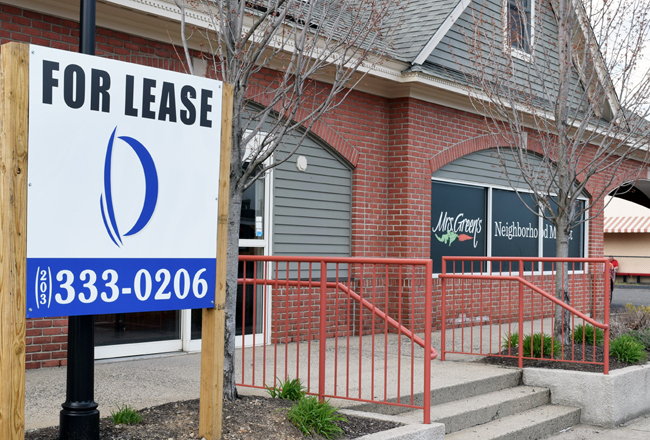 Although he still has some 18 months remaining in his second term, Connecticut Gov. Dannel Malloy”™s recent announcement that he would not seek a third term has already engendered talk about his legacy to the state”™s business community. For the most part, the reviews aren”™t very good.
Although he still has some 18 months remaining in his second term, Connecticut Gov. Dannel Malloy”™s recent announcement that he would not seek a third term has already engendered talk about his legacy to the state”™s business community. For the most part, the reviews aren”™t very good.
“The governor came in at a really difficult time, when the state had enormous fiscal problems,” said Joe Brennan, president and CEO of the Connecticut Business & Industry Association. “And he was not able to get us out of tough economic times. In general, we didn”™t see the economy rebound as we all hoped it would.”
“It”™s worth remembering that when Malloy came into office he inherited a very big deficit,” said Chris Bruhl, president and CEO of The Business Council of Fairfield County. “And that was the result of more than a generation of reality avoidance, both by his predecessor governors and the General Assembly.”
That Connecticut routinely finishes low in business-related national surveys ”” CNBC”™s most recent Top States for Business survey placed it 43rd, while it received an overall F grade in last summer”™s Thumbtack Small Business Friendliness Survey ”” is indicative of the incumbent”™s overall failure to move the state”™s business needle in a positive direction.
“A governor probably gets too much credit when things go well and receives too much blame when things don”™t go well,” Brennan said. “We disagreed with him on some of his fiscal policy decisions. The tax increases he pushed in 2011 and 2015 were a little more than we thought was good for the state of Connecticut.”
On balance, the CBIA chief said, “We had a good relationship. I think the governor would be the first to say that we haven”™t seen the growth in the economy and the creation of new jobs that we”™d like to see.”
Criticism of the governor has only grown louder over the past year. In January, the criticism escalated when he announced that his plan to solve the state”™s $1.7 billion deficit included $1.36 billion in new spending reductions and asked Connecticut”™s municipalities to contribute one-third of the cost toward their schools”™ teacher pensions.
In his recent State of the Town address, Fairfield First Selectman Mike Tetreau said that while General Electric”™s exit from the town last year will have a significantly negative impact on tax revenue, “The major component of the revenue shortfall is caused by instability at the state level. This instability is leading to dramatic and immediate reductions in aid, leaving us with little time to adjust.”
Tetreau, a Democrat, has given no indication that he”™ll run for the governor”™s office next year. But several of his Republican counterparts who are expected to run in 2018 have their own uniformly negative views on the departing Democratic governor.
“The end of the Malloy era is welcome news for those who believe in opportunity for our citizens, low taxes and fiscal responsibility,” said Trumbull First Selectman Tim Herbst. “I think he”™s gotten it wrong with tax policy, with not tackling meaningful pension reform and I think he undermined the integrity of clean elections in our state with his deliberate attempt to circumvent clean election laws.”
Danbury Mayor Mark Boughton said that Malloy”™s exit is symbolic of the fact that “The far-left agenda is broken and does not work in Connecticut. His decisions didn”™t result in positive job growth or realistic, responsible state budgets.”
“Things are going very wrong in the state ”” that”™s absolutely obvious to many people,” said Shelton Mayor Mark Lauretti, who formally announced his candidacy on April 6. “The business climate of Connecticut is terrible ”” businesses are leaving, there aren”™t enough jobs for young people. And affordability is the biggest driver for people of all ages and backgrounds.”
One person unequivocal in his praise of Malloy was Jim Wadleigh, CEO of Access Health CT, the state”™s health insurance exchange.
“His early embrace of the Affordable Care Act is definitely a part of his legacy,” Wadleigh said. “He was the rock behind creating the best exchange in the country. From my perspective, he and Lt. Gov. (Nancy) Wyman were the backbone for creating such a stable marketplace. The state of Connecticut owes him a big debt of gratitude for that.” Wyman chairs the state health exchange board
The governor”™s actions have been less well-received by others in the health care sector. His budget plan would cut an $11.8 million fund that has provided money to small, independent hospitals and would restore the administration”™s ability to cut more than $120 million in funding to hospitals if the state faces a budget shortfall.
Vincent Petrini, senior vice president for public affairs at the Yale New Haven Health System, which includes Bridgeport and Greenwich hospitals, said the system already pays over $200 million in taxes to the state, making it Connecticut”™s single largest taxpayer ”” despite being a nonprofit.
Malloy’s teacher pension proposal is also under attack. Herbst asked Trumbull residents to contact legislative leadership at the state level and urge them to oppose Malloy”™s proposition, which he said would leave Trumbull responsible for an additional $5.6 million in pension costs. “This will cause a very dramatic property tax increase in Trumbull, hurting our seniors on fixed incomes and those that are living paycheck to paycheck as they continue to deal with the impact of a state economy that lags behind the rest of the nation,” Herbst said.
Asked what he hoped Malloy”™s successor would do, Danbury”™s mayor said, “The most important priority is to re-establish positive relationships with the state”™s businesses. We need to let CEOs and employers know that they”™re appreciated. That doesn”™t cost a dime, but it will set the tone that we”™re looking to grow the economy and add more jobs.
“The second thing is to try to change the culture of the legislature and the state government in general,” Boughton said. “We need to stop the insanity that bubbles up in the legislature every year.”
Lauretti said the next governor “has to firm up our financial footing first of all. The status quo is unacceptable.”
The next governor, said Brennan at the CBIA, “has to take an aggressive approach to putting our fiscal problems behind us so that we can truly focus on the other issues facing us. That”™s paramount.”
“Just being rid of Govenor Malloy will not be enough to save our state,” said Herbst “Connecticut must send a new generation of leadership, outsiders who haven”™t been a part of the problem, to Hartford if we are going to get different results from Hartford.
“As for what he”™s gotten right, I think his willingness to take on some of our infrastructure problems head-on was long overdue,” Herbst added. “Notwithstanding his legislative reaction, I think the compassion he showed to the families who lost loved ones at Sandy Hook Elementary School was admirable and showed leadership.”





















